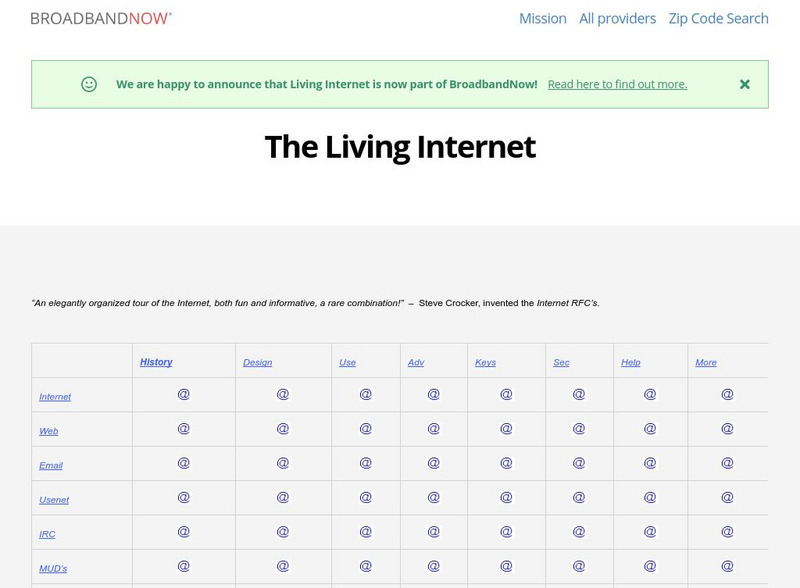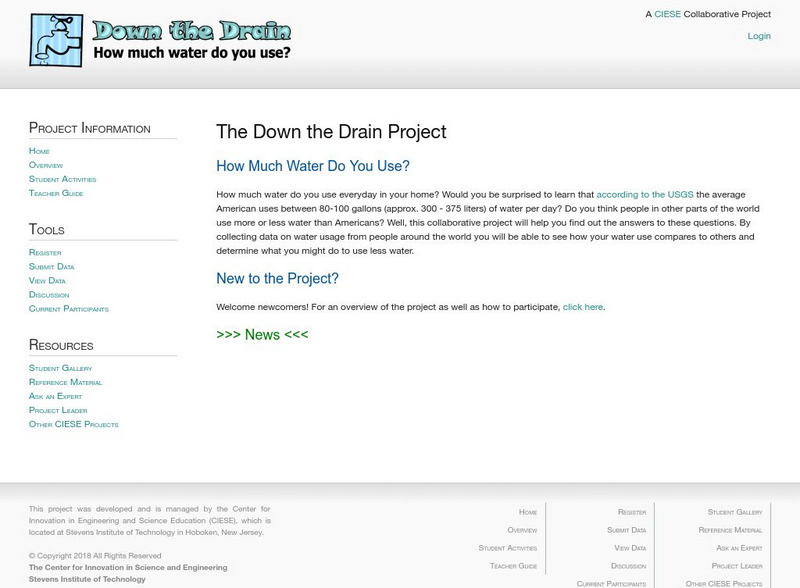University of North Carolina
Blogs
The blogosphere may be overwhelmed with content, but there's still room for unique points of view. Creating a blog that stands out, however, is the bigger challenge. A handout on blogs, part of a series of handouts on specific writing...
Annenberg Foundation
Geometry 3D Shapes: Euler's Theorem
How do you get a theorem named after you? Euler knows what it takes! The third lesson of five asks pupils to use an interactive activity to compare the faces, vertices, and edges of seven different three-dimensional solids. They use...
Ducksters
Ducksters: Kids Safety: Using the Internet
On this website, students can explore how to use the internet safely. This site has students learning web safety with tips from the FBI.
Other
Broadband Now: The Living Internet
How much do you really know about the Internet? How does it work? Who invented it? The Living Internet has answers to these questions and just about everything else you ever wanted to know about our online world. Sections on: Internet,...
Other
U.s. Securities and Exchange Commission: Internet Fraud
"This alert tells you how to spot different types of Internet fraud, what the SEC is doing to fight Internet investment scams, and how to use the Internet to invest wisely."
Other
Literacy Works: Thanks to the Web, We're Alone Together and Loving It
While this resource was developed to support adult literacy learners, it can easily be used from junior grades and up. After reading an article about how people today interact on the Internet, students complete a variety of vocabulary...
The Franklin Institute
The Franklin Institute: Minutes From Me: First Steps in Browsing
Using the internet for research can be a bit overwhelming for young students. This site shows how to create some simple web pages that can be used to teach young students how to best navigate the internet for research.
Other
The Shuler Family: How Does the Internet Work?
Here you can get a technical but accessbile overview of the Internet. Learn about Internet addresses, networking infrastructure, Internet routing hierarchy, domain names, Internet protocols, and so on. Illustrated.
PBS
Pbs News Hour: Race to Watch: Campaign 2008, Role of Technology and the Internet
Is the internet effective as a campaign tool? Help your students explore how presidential candidates use technology and the internet in their political campaigning in the twenty first century with this lesson plan from PBS NewsHour.
Get Safe Online
Get Safe Online: Safe Internet Use
No matter what software a person uses to browse the internet, there are security risks involved. This article describes some of the security risks and how to browse the internet safely.
Other
Stop Cyberbullying: Cyberbullying
Stop Cyberbullying provides information on cyberbullying for students, parents and careers. Learn, how it works, why people use the internet to bully, how to prevent it, what action to take and the law. Take the survey and find out if...
BBC
Bbc: My Web My Way: Homepage
The tutorial explains how learners can alter their computer, browser, keyboard, and mouse settings to make the web more accessible.
Get Safe Online
Get Safe Online: Use Strong Passwords
Almost everyone that uses the internet accesses a site that requires a password. This site describes how to create strong passwords that are not easily guessed or cracked.
Center for Innovation in Engineering and Science Education, Stevens Institute of Technology
Ciese Collaborative Projects: Down the Drain: How Much Water Do You Use?
Meet another classroom and study how much water your class uses compared to another class that may be in another part of the world. Through a variety of activities and gather data be able to collaborate with others via the internet to...
Other
Ic You See: T Is for Thinking: Guide to Critical Thinking
This clearly presented tutorial can be used by individuals or could be presented to a class. Be sure to take the interactive quiz for some thought-provoking exercises.
The Franklin Institute
The Franklin Institute: Minutes From Me: Build a "Links to Click" Web Page
Teachers are sometimes reluctant to turn students loose on the internet. This site explains how to create a simple webpage using HTML that guides the students to the intended sites.
Other
Storytelling to Assess Speaking and Listening
An effective use of rubrics that encourages the student storyteller how to determine if his/her audience is listening. Learn about the different listening skill rubrics, storytelling rubrics and a self-assessment guide that asks the...
Other
The Internet Mediator
Use this entire site to learn about how mediators are trained, how to mediate on-line, and why mediation is necessary.
Center for Innovation in Engineering and Science Education, Stevens Institute of Technology
Ciese Collaborative Projects: Down the Drain: How Much Water Do You Use?
How much water do you use everyday? Find out in this engaging investigation, where you compare your water usage with your classmates and other people around the world. An exploration filled with lots of math and science that students are...
Get Safe Online
Get Safe Online: Protect Your Privacy
Many people that use the internet seem to be more willing to give out personal information than they would in other settings. This can be very dangerous. This resource describes how to protect your privacy while using the internet.
Other
Classroom Tech: Evaluating Web Credibility
There is a vast amount of information on the internet, but how much of it is credible? This site presents tips on how to verify the information on a website and not be fooled by web "spoofs". Refer to the checklist for evaluating sources.
Other
Classroom Tech: Web Searching Skills
Presented as a helpful guide for educators wishing to teach their students how to search the web, this site provides several guides and quizzes for use in the classroom.
University of California
Uc Berkeley Library: Finding Historical Primary Sources
Got a research project? Read this site from the UC Berkeley Library. A great guide on finding the best primary sources for your research. Defines both narrow and broad ideas of primary source, links to online archives of primary sources,...
Get Safe Online
Get Safe Online: Safe Social Networking
Social networking sites are very popular. They also expose people to certain risks, such as online bullying, loss of privacy, cyber stalking and other problems. This resource describes some of the risks with social networking sites and...



















